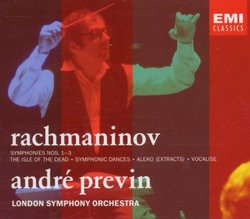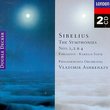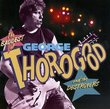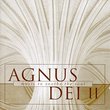| All Artists: Sergey Rachmaninov, Andre Previn, London Symphony Orchestra Title: Sergey Rachmaninov: Symphonies Nos. 1-3; The Isle of the Dead; Symphonic Dances; Aleko (Extracts); Vocalise Members Wishing: 0 Total Copies: 0 Label: EMI Classics Release Date: 4/13/1993 Genres: Dance & Electronic, Classical Styles: Opera & Classical Vocal, Forms & Genres, Theatrical, Incidental & Program Music, Historical Periods, Modern, 20th, & 21st Century, Symphonies Number of Discs: 3 SwapaCD Credits: 3 UPCs: 077776453026, 077776453057 |
Search - Sergey Rachmaninov, Andre Previn, London Symphony Orchestra :: Sergey Rachmaninov: Symphonies Nos. 1-3; The Isle of the Dead; Symphonic Dances; Aleko (Extracts); Vocalise
 | Sergey Rachmaninov, Andre Previn, London Symphony Orchestra Sergey Rachmaninov: Symphonies Nos. 1-3; The Isle of the Dead; Symphonic Dances; Aleko (Extracts); Vocalise Genres: Dance & Electronic, Classical
|
Larger Image |
CD DetailsSimilar CDs
Similarly Requested CDs
|
CD ReviewsThese performances are wonderful Samuel | Montreal | 12/31/1999 (4 out of 5 stars) "The second symphony from this recording is by the far the stormiest and loveliest recording of this momenumental masterpiece that I have heard. The opening with its brooding melody has never failed to induce within me a certain tinge of despair. The quality of sound on these recordings are certainly not as not advanced as the set by Ashkenazy, but I certainly do feel that the recordings here give a more honest reading of the symphonies gigantic depth. No other recording features chimes in the first symphony's opening movement (the middle section after the music has exploded into a rage of uncalculated fury-leaping into cosmos of bittersweetness and savoured elegia), you certainly don't find these chimes present in Maazel's or Ashkenazy's recordings. Although I must say that the third symphony is a bit ill-conceived here by Previn and the LSO, they still manage to deliver a solid performance with much emotion: the performers were never lazy from the start- contrary to other opinions..... I think the true gem comes from the second symphony's Largo movement, I certainly see this beautiful movement as a sort of soundtrack to a "romantic outting =) ", and quite honestly, Previn's rendition of it has been the only one that has ever conduced a feeling of absolute warmth and beauty to me the listener... Buy it, and see for yourself why Previn's rendition truly matches up to other recordings of these masterpieces." Competent, slow, steady but uninspired 2nd Joseph L. Howlett | 03/18/2001 (3 out of 5 stars) "I have only heard the 2nd symphony from this set (in EMI's Great Recordings of the Century remastering, which seems not to be available yet...) so my comments are restricted to that work. Looking at the reviews below, it appears that some people really like this performance. I respect their opinions, but I can only report my own honest reaction to this performance, which is that is is too slow, too uninflected, and ultimately too boring for my taste.As a reviewer states below, this performance was taped after a successful tour by Previn and the London Symphony Orchestra which showcased the Second. However, the notes in the Great Recordings edition report that the taping took place over a year after the tour ended (although the players wanted it taped immediately). This delay may explain what I hear as a routineness about the performance. There is certainly nothing wrong with the quality of the orchestral playing or the sound engineering (although neither approaches what Ormandy and the Philadelphia achieved in the Sony version of 1959, 12 years earlier). But I just don't hear anything special here.In all four movements, tempos are consistently on the slow side. What is more, Previn takes a very straightforward interpretative approach, when I feel that this music cries out for the little touches of magic, such as Rachmaninov shows in his own recording of the Third Symphony. Compare with the earlier Ormandy recording: although Ormandy takes similarly steady tempos in the first three movements, his orchestra, especially the strings, knows how to put a little rubato here, a little portamento there, to bring this large work to life. With Previn it just sounds like a play through by a very competent orchestra and conductor.The one really distinctive feature of this recording is the account of the slow movement. I find it repellent, but others may like it. Previn takes a very slow, gentle, soft-focused approach which reminds me of film music for a Hollywood romance. I yearn for a more passionate and intense approach here, but Previn's way is an interesting alternative.An important issue in considering any recording of this symphony is that of cuts. Many recordings (particularly older ones) excise large amounts of Rachmaninov's music (up to 25%). The older Ormandy I mentioned above is a tragic example of this. This recording is complete and uncut (with the exception of the first movement repeat). Good for Previn, then. Some British critics get very excited by the fact that before this recording was made, most recordings were cut, and that after it, they tended to be complete -- as if Previn had somehow single-handedly changed the climate for Rachmaninov's music. However, there are older uncut recordings --- for example, Leopold Stokowski's 1946 live performance with the Hollywood Bowl Orchestra and Paul Kletzki's Suisse Romande account. In fact, listening to Previn's performance somethimes made me think that the cuts were a good thing after all.I would recommend against this account of the 2nd symphony. My favorite account -- by Dmitri Kitaenko (Kitayenko) with the Moscow Philharmonic -- is hard to find. The aforementioned Ormandy is magnificent but heavily cut. Given this, I also suggest Ashkenazy with the Concertgebouw Orchestra or Pletnev with the Russian National Orchestra." Excellent set Mr. Allan K. Steel | Sydney, AUS | 02/22/2005 (5 out of 5 stars) "An excellent set.
Sym 1, Isle of the Dead and Symphonic Dances are all done extremely well, which is all that matters, since these are Rachmaninov's orchestral works of sheer genius (plus the Bells), in my view. Pletnev's Rach Sym 1 on DG is pretty good too, but you can't go wrong with this set." |

 Track Listings (5) - Disc #1
Track Listings (5) - Disc #1













